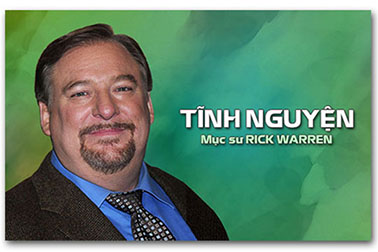- Chuyên mục: Tĩnh Nguyện Hằng Ngày - Mục sư Rick Warren

 “Mỗi người hãy dùng ân tứ mình đã nhận mà phục vụ nhau, như người quản lý trung tín khéo sử dụng ân điển của Đức Chúa Trời nhiều cách khác nhau.”
“Mỗi người hãy dùng ân tứ mình đã nhận mà phục vụ nhau, như người quản lý trung tín khéo sử dụng ân điển của Đức Chúa Trời nhiều cách khác nhau.”
(IPhi 4:10 BHĐ)
Bạn có biết Chúa dựng nên bạn để làm gì không? Bạn có biết định mệnh của mình là gì không? Có vài điều bạn cần làm để hoàn thành vận mệnh mà chúng ta sẽ xem xét một cách kỹ lưỡng trong vài ngày tới qua những ví dụ minh họa trong sách Ê-xơ-tê.
Điều đầu tiên bạn phải làm là nhận biết những ân tứ Chúa ban. Những ân tứ ấy bao gồm những điều bạn không thể kiểm soát - bố mẹ, quốc tịch, chủng tộc, ngôn ngữ của bạn. Chúng cũng bao gồm sự ĐỊNH DẠNG của bạn – ân tứ thuộc linh, thiên hướng của tấm lòng, khả năng, nhân cách và kinh nghiệm của bạn. Đây là những điều khiến bạn trở nên độc nhất vô nhị.
Vậy thì, bạn không phải chịu trách nhiệm cho những ân tứ mà Chúa không ban cho bạn. Nói cách khác, nếu bạn không có năng khiếu nghệ thuật, bạn không cần phải vẽ những bức tranh như Rembrandt (là một họa sĩ nổi tiếng người Hà Lan). Nhưng bạn phải có trách nhiệm với những ân tứ mà Ngài đã ban cho bạn.
Khi bạn lên thiên đàng, Chúa sẽ không so sánh bạn với bất kỳ ai khác, mà Ngài sẽ so sánh bạn với chính bạn. Bạn đã làm gì với những gì bạn đã được ban cho? Bạn đã có thể làm được gì nếu bạn tin cậy Chúa hơn một chút? Rô-ma 14:12 chép: “Như vậy, mỗi chúng ta sẽ tường trình về chính mình với Đức Chúa Trời.” (BHĐ)
Chúa đã ban cho Ê-xơ-tê một ĐỊNH DẠNG được thiết kế độc đáo để giúp cô hoàn thành vận mệnh của mình. Kết quả là “Ê-xơ-tê được ơn trước mọi người nhìn thấy cô…cô được ơn trước mặt vua hơn tất cả những trinh nữ khác. Vậy vua đội vương miện lên đầu cô và lập cô làm hoàng hậu” (Ê-xơ-tê 2:15,17 BHĐ)
Đức Chúa Trời ban cho Ê-xơ-tê những ân tứ ấy là có mục đích. Ngài cũng ban cho bạn ân tứ vì một mục đích nào đó. Và, giống như Ê-xơ-tê, bạn có trách nhiệm quản lý tốt những ân tứ đó. Chúa đã ban cho bạn những ân tứ đó không chỉ vì lợi ích của bạn mà còn vì lợi ích của những người khác nữa. Khi bạn khám phá ra những ân tứ của mình và quyết định sử dụng chúng vì lợi ích tốt đẹp thì Chúa sẽ sử dụng bạn, như Ngài đã sử dụng Ê-xơ-tê, cho mục đích của Ngài trên đất.
Câu hỏi suy ngẫm & áp dụng
1. Hãy liệt kê những ân tứ, khả năng, tài nguyên mà Đức Chúa Trời ban cho bạn. Hãy tự hỏi "Chúa đã ban cho tôi những ân tứ nào để tôi phục vụ mang đến ích lợi cho người khác?"
2. Xin đơn cử một phương cách bạn sẽ dùng ân tứ của mình vì lợi ích tốt đẹp trong tuần này?
3. Vì sao có sự tự do trong việc thực hiện những điều Đức Chúa Trời đã đặc biệt dựng nên bạn để làm?
To Know Your Destiny, First Recognize Your Gifts 200718
BY RICK WARREN —
“Each one, as a good manager of God’s different gifts, must use for the good of others the special gift he has received from God.” 1 Peter 4:10 (GNT)
Do you know what God created you for? Do you know what your destiny is? There are several things you need to do in order to fulfill your destiny that we’ll go through over the next few days using illustrations from the book of Esther.
The first thing you must do is recognize the gifts God has given you to use. These include the things you can’t control—your parents, nationality, race, language. They also include your SHAPE—your spiritual gifts, heart, abilities, personality, and experiences. These are the things that make you uniquely you.
Now, you are not responsible for the gifts God didn’t give you. In other words, if you are not artistically gifted, you are not expected to paint pictures like Rembrandt. But you are responsible for the ones he did give you.
When you get to heaven, God isn’t going to compare you with anyone else, but he will compare you with yourself. What did you do with what you were given? What could you have done if you had trusted God a little bit more? Romans 14:12 says, “Each of us will give an account of ourselves to God” (NIV).
God gave Esther a SHAPE uniquely designed to help her fulfill her destiny. As a result, “Esther won the favor of everyone who saw her . . . she won [the king’s] favor and approval more than any of the other virgins. So he set a royal crown on her head and made her queen” (Esther 2:15, 17 NIV).
God gave Esther gifts for a purpose. He has also given you gifts for a purpose. And just like Esther, you have a responsibility to be a good steward of those gifts. They are not just for your benefit. God gave them to you for the benefit of others. When you discover your gifts and determine to use them for good, God can use you, just like he used Esther, for his purposes on Earth.
Talk It Over
1. Make a list of the gifts God has given you—don’t forget to include your SHAPE and the things you can’t control. Ask yourself, “What has God given me to use for good?”
2. What is one way you can use your gifts for good this week?
3. Why is there freedom in doing what God created you to uniquely do?
What Will You Do with What You’ve Been Given?
“Each of us, as a good manager of God’s different gifts, must use for the good of others the special gift he has received from God.” (1 Peter 4:10 TEV)
Do you know what God created you for? Do you know what your destiny is?
In order to fulfill your destiny, you must recognize the gifts God has given you to use. These are the cards you are dealt in life. They include the things you can’t control: your parents, your nationality, your race, your native language. They also include your SHAPE: your spiritual gifts, heart, abilities, personality, and experiences. These are the things that make you uniquely you.
Now, you are not responsible for the gifts God didn’t give you. In other words, if you are not artistically gifted, you are not expected to paint pictures like Rembrandt. But you are responsible for the ones he did give you.
When you get to Heaven, God isn’t going to compare you with anyone else, but he will compare you with yourself. What did you do with what you were given? What could you have done if you had trusted God a little bit more? Romans 14:12 says, “Each of us will give an account of ourselves to God” (NIV).
Esther had three assets that God gave her to use to fulfill her destiny. She was intelligent, beautiful, and she had an attractive personality. Because of these qualities, “Esther won the favor of everyone who saw her …. She won [the king’s] favor and approval more than any of the other virgins. So he set a royal crown on her head and made her queen” (Esther 2:15b, 17).
God gave Esther these gifts for a purpose. God has given you gifts for a purpose. And just like Esther, you have a responsibility to be a good steward of those gifts — not for selfish uses but for the good of others. Your gifts are not for your benefit. God gave you gifts for the benefit of other people.
Talk It Over
- In order to know your destiny, you have to know your talents and decide how to use them. Make a list of the gifts God has given you (don’t forget to include your SHAPE and the things you can’t control). Ask yourself, “What has God given me for good to use for good?”
- How can you help others discover their SHAPE and purpose?
- What are some practical ways you can get out of the rut of comparing yourself to others?
